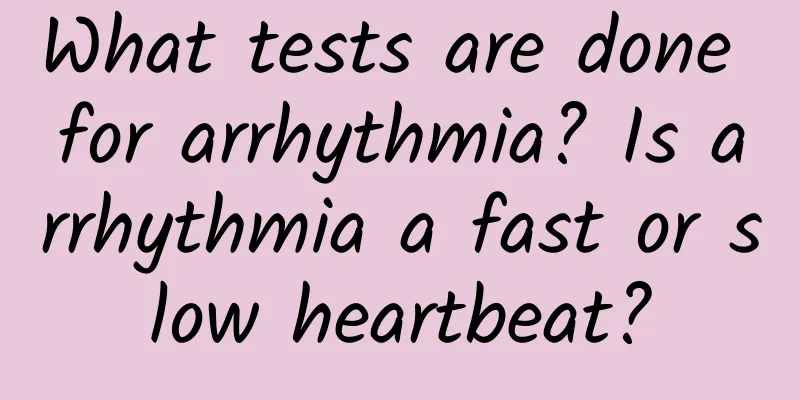What tests are done for arrhythmia? Is arrhythmia a fast or slow heartbeat?

|
Arrhythmia is easy to understand. It means that the heart beats irregularly. Arrhythmia is not a direct indication of heart disease, but it should be checked and treated in time to avoid the development of more serious diseases such as coronary heart disease. What tests are done to diagnose arrhythmia?1. Routine electrocardiogramDo an electrocardiogram when the panic attacks. Conventional electrocardiograms can only capture the electrocardiogram information at that time. If there is no panic attack at that time, the electrocardiogram will not be able to detect arrhythmia. 2. Holter testIf the palpitations are paroxysmal and recurring, this test can be done to evaluate the 24-hour ECG status. Currently, there are also some dynamic ECGs that can be done for 3 days to capture the ECG status during the attack. 3. Implantable HOLTER (LINK):For arrhythmias that occur infrequently but cause serious consequences, such as unexplained syncope, this test can be selected to clarify the nature of the arrhythmia. When the patient has symptoms, the ECG data can be manually triggered to freeze and store, and it can be immediately understood whether the symptoms are related to arrhythmia. In addition to capturing arrhythmia information, we should also actively look for the cause of the arrhythmia and perform cardiac color Doppler ultrasound to check whether there is organic heart disease such as heart failure, valvular disease, etc. In some patients, arrhythmia is caused by myocardial ischemia and requires coronary angiography or coronary CTA examination. Is arrhythmia a fast or slow heartbeat?There are many ways to classify arrhythmias. If classified according to ventricular rate, there are two types: TachycardiaIt refers to a heart rate of more than 100 beats per minute, usually caused by excessively rapid release or reentry of cardiac electrical stimulation signals, including ventricular tachycardia, paroxysmal supraventricular tachycardia, atrial flutter, ventricular flutter, atrial fibrillation and ventricular fibrillation. BradycardiaIt refers to a heart rate of less than 60 beats per minute, usually caused by a decrease in the release or interruption of cardiac electrical stimulation signals, including sinus bradycardia, sinus arrest, sinoatrial block, atrioventricular conduction block, etc. The degree of bradycardia depends on the patient's age and activity; a newborn's heart rate is usually no less than 80 beats/minute, and an athlete's resting heart rate is about 50 beats/minute or slower. What is the frequency (heart rate) of normal sinus rhythm? The heart rate range of normal sinus rhythm is usually set at 60 to 100 beats/minute. A heart rate faster than 100 beats/minute is defined as tachycardia, and a heart rate slower than 60 beats/minute is defined as bradycardia. Is arrhythmia a heart disease?Arrhythmia does not necessarily occur in patients with organic heart disease. Some arrhythmias are manifestations of organic heart disease (such as coronary heart disease, cardiomyopathy, myocarditis, heart failure, etc.), and some patients with arrhythmias may not have any organic lesions in their hearts. Generally speaking, if there is no organic heart disease, ventricular premature beats and short bursts of ventricular tachycardia will not cause serious consequences, and it is not advisable to treat them too aggressively. If the patient has organic lesions such as coronary heart disease, cardiomyopathy, heart failure, etc., these underlying diseases should be actively treated after arrhythmias occur. When choosing antiarrhythmic drugs, b-receptor blockers should be used first. Propafenone, mexiletine, incainide and other drugs should not be used, because although the latter drugs can reduce the occurrence of ventricular premature beats or ventricular tachycardia, they may increase the mortality rate because these drugs can induce more serious arrhythmias and even cause sudden death. Some people have done many tests for premature beats but have not found any heart disease, but they are still worried and continue to seek medical treatment everywhere. This is unnecessary. Such premature beats will not cause serious consequences, and overtreatment is not good, so there is no need to worry too much. |
Recommend
What should women do if they have uterine cysts?
Uterine cyst in women is a relatively common gyne...
Do you know how many days after sex the fertilized egg will implant?
For newly married couples, having children is the...
Can weight loss reverse non-alcoholic fatty liver disease? Different from foreign guidelines, new evidence from the Chinese population
As we all know, excessive drinking and viral hepa...
What causes headaches in old women?
We may all have headaches. In some cases, headach...
What should pregnant women do if their gums are swollen due to inflammation?
For female friends, pregnancy is a special period...
Backache and bloating, what's wrong with that?
Sometimes women feel very strange about a conditi...
How long does it take to get pregnant when hyperthyroidism indicators are normal?
From the perspective of eugenics, it is best for ...
Eating chicken wings often can easily lead to uterine tumors. It is unbelievable. Do 4 things to prevent it.
Recently, an article was widely forwarded online....
How to make pig heart soup for pregnant women
As a woman's pregnancy progresses, her body w...
Signs and symptoms of calcium deficiency in pregnant women
It is very important to supplement calcium and zi...
What causes breast pain? Female friends must understand
Most female friends have experienced breast pain....
Why do women want to sleep when they feel tired and weak?
People often feel tired and weak, especially thos...
Why do girls wet the bed? Enuresis is the culprit
It is normal for children to wet the bed, but if ...
Is bread bad when it turns sour? Why is sawdust added to black bread?
Bread is also called artificial fruit, and there ...
Gynecological Daconin Suppository Instructions
Daktarin suppository is a common gynecological ex...









